Sermons
STEWARDSHIP
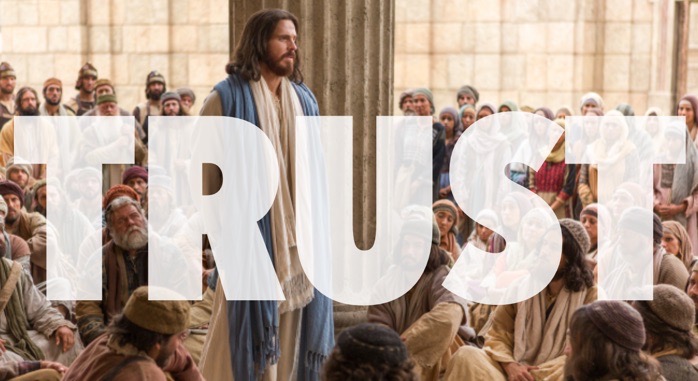
MATTHEW 22: 15-22 NIV
JESUS IN THE TEMPLE
Over the past weekend, what with the Kavanaugh hearings, I think we’ve all learned a bit about trying to answer questions designed as a trap. As Jesus teaches in the Temple, he’s approached by Pharisees and Herodians who are well-prepared to present him a lose/lose question.
The Pharisees were the “true believers,” the ones who were really on fire for the Lord (not like those lukewarm Presbyterians!). The Herodians were a political party of devout Jews associated with the “king” of Israel and his authority. In short, Jesus is surrounded by lawyers in a very public place. Jews and Gentiles are in the audience, all waiting for Jesus to say things they would like to hear. The questions come to Jesus thick with unctuous rhetoric:
“Teacher,we know that you are a man of integrity and that you teach the way of God in accordance with the truth. You aren’t swayed by others, because you pay no attention to who they are.”
The flattery may have disarmed the zealots in the crowd from thinking of the Pharisees or Herodians as the bad guys. They seem respectful and sincere until their question comes:
“So Jesus, do you still beat your wife?”
That’s not an exact quote, but we get the effect. Jesus calls them out and exposes their hypocrisy.
The actual question—Is it right to pay the imperial tax to Caesar or not?—is a calculated one. From the time of the first census, the Jews were taxed by their Roman occupiers. This tax could run as high as 30%. If they failed to pay their taxes, their land could be seized. It’s no wonder the Jews despised the Romans and longed for a Messiah who would overthrow Rome and enact political and economic reforms. It’s also no wonder why they hated tax collectors—Jews who profited from the losses of the people.
Aside from the 30% taxes, Jews were expected to pay a tithe to the Temple. For many ordinary Jews, the burden of both was enough to break them or force them to make difficult choices. If they didn’t pay their taxes, they lost the land passed down to them by their parents and grandparents, but if they failed to tithe, then they lost their relationship and standing with the Temple and were cut off as Jews. It is these—the Jews who lost ties with the Temple—who were called “sinners” in the gospels. They may have loved God and served God, but in withholding their tithe, they were disowned by Temple authorities.
In answering the question, Jesus asks to see one of the Roman coins. Whoever it was that produced it revealed a hypocrisy, for the coin—a denarius—holds the engraved image of Caesar upon it. Furthermore, as Caesar claimed to be God, the coin constitutes an idol by every definition, and here was a devout Jew carrying one within the Temple grounds!
Those who sought to trap Jesus had asked a simply yes-or-no question. If Jesus had answered, “Yes, it’s right to pay taxes,” then the common folk and zealots would have been angered, for in doing so Jesus would have condoned the people’s oppression and implicitly denied the legitimacy of Israel’s self-rule. If he answered, “No, it’s not right to support our oppressor,” then the radicals in the crowd would have been overjoyed, but the Gentiles would have seized him for sedition. It was a lose/lose question.
Jesus’ answer is brilliant. He says, in effect, “If Caesar’s name and image are upon the coin, then they clearly belong to Caesar and he is rightful to claim it.”
Any listeners hoping that Jesus would initiate a tax revolt would have been deeply disappointed.
Jesus doesn’t end it there, but adds the cryptic: “and give to God what belongs to God.” The Temple tithe also needed to be paid.
During the second Temple period—including the time when Jesus was there—expected all payment in the form of Temple-approved shekels (half-shekel from late 60s pictured below). As taxes belong to Caesar, tithes belong to God. Jesus says, “Pay both.” Many common folk would have said, “but it’s impossible!” We privately hear the same thing today whenever we suggest that tithing is a worthy practice for Christians. Here’s the thing: if Jesus expects it, he will empower it as well. That we have to take on trust.
TITHES, GIFTS, ETC.
Tithing means giving 10% off the top. The first biblical instance comes in Genesis 14:18-20:
Then Melchizedek king of Salem brought out bread and wine. He was priest of God Most High, and he blessed Abram, saying, “Blessed be Abram by God Most High, Creator of heaven and earth. And praise be to God Most High, who delivered your enemies into your hand.” Then Abram gave him a tenth of everything.
Next, we hear Jacob after his experience with the stairway to heaven in Genesis 28:20-22:
Then Jacob made a vow, saying, “If God will be with me and will watch over me on this journey I am taking and will give me food to eat and clothes to wear so that I return safely to my father’s household, then the Lord will be my God and this stone that I have set up as a pillar will be God’s house, and of all that you give me I will give you a tenth.”
Once the people were established, tithing became the norm. The Levites were the first recipients as we read in Numbers 18: 21-24:
To the Levites I have given every tithe in Israel for an inheritance, in return for their service that they do, their service in the tent of meeting…. It shall be a perpetual statute throughout your generations, and among the people of Israel they shall have no inheritance. For the tithe of the people of Israel I have given to the Levites for an inheritance. Therefore I have said of them that they shall have no inheritance among the people of Israel.
We hear it again in Leviticus 27: 30-32:
“‘A tithe of everything from the land, whether grain from the soil or fruit from the trees, belongs to the Lord; it is holy to the Lord. Whoever would redeem any of their tithe must add a fifth of the value to it. Every tithe of the herd and flock—every tenth animal that passes under the shepherd’s rod—will be holy to the Lord.
To withhold one’s tithe was seen as a way of stealing from God, as we read in Malachi 3:8-9:
Will man rob God? Yet you are robbing me. But you say, ‘How have we robbed you?’ In your tithes and contributions. You are cursed with a curse, for you are robbing me, the whole nation of you.
But tithing came with a reassurance as well—that God would bless back the one who tithed. According to Malachi 3: 10, God invites us to test him in this:
“Bring the whole tithe into the storehouse, so that there may be food in My house, and test Me now in this,” says the LORD of hosts, “if I will not open for you the windows of heaven and pour out for you a blessing until it overflows.”
NEW TESTAMENT TITHING AND GIVING
In the New Testament, we hear Jesus in support of the practice of tithing, even in the midst of an admonishment:
“Woe to you, teachers of the law and Pharisees, you hypocrites! You give a tenth of your spices—mint, dill and cumin. But you have neglected the more important matters of the law—justice, mercy and faithfulness. You should have practiced the latter, without neglecting the former.” Luke 11:42
Christians have practiced tithing from the beginning of the Church to the present day. It doesn’t matter how much you make; tithing affects us all the same. We can’t begin too soon, nor should we wait until we can afford it, because the amount will always go up as our salary does.
Listen to the world’s wealthiest man, John D. Rockefeller(worth $350 billion by today’s standards, which is more than twice the net worth of Jeff Bezos, presently at about $ 136 billion), who was a practicing Baptist and inveterate tither:
Most of us feel that if we lean into a full ten percent giving, the rest of our life will grind to a standstill. We’re saying the opposite is the true case—the reality. It was well-put by Billy Graham:
I’ll remind you that we are invited to test God in this! Even so, most will not dare to tithe. Here are the facts:
TITHING FACTS
According to Pew and Gallup research, a mere five percent of Christians in America practice tithing.80% give roughly 2% of their income. The five percent who tithe affects the overall average such that Christians give 2.5 % per capita. During the Great Depression Christians gave at a 3.3% per capita rate.
And now, for the bigger reveal: the New Testament encourages giving at levels well above the tithe! As early as John the Baptist’s ministry we hear:
“Anyone who has two shirts should share with the one who has none, and anyone who has food should do the same.” [Luke 3:11]
That’s clearly 50%. Jesus expects more:
As Jesus looked up, he saw the rich putting their gifts into the temple treasury. He also saw a poor widow put in two very small copper coins. “Truly I tell you,” he said, “this poor widow has put in more than all the others.All these people gave their gifts out of their wealth; but she out of her poverty put in all she had to live on.” LK 21:1-4
Jesus wants 100%, not a mere tithe.
The early Church was characterized by a boundless generosity, which is still a desirable virtue. We read in Acts 2: 44-45:
And all who believed were together and had all things in common. And they were selling their possessions and belongings and distributing the proceeds to all, as any had need.
And again in Acts 4: 34-35:
There was not a needy person among them, for as many as were owners of lands or houses sold them and brought the proceeds of what was sold and laid it at the apostles’ feet, and it was distributed to each as any had need.
In my semester-and-a-half as a socialist in college, these verses were my support. While the early Church did not continue in these practices, nor do I feel that they represent the basis of a workable economy, I hear their call to abandon all attachments to the love of money, wealth, and possessions. We, like the early Church, ought to emulate that healthy attitude which can and does say: “It’s only money,” or “It’s just stuff.” A clear word is spoken by Paul in 2 Corinthians 9:7 when he says:
"Each one should give what he has decided in his heart to give, not reluctantly or under compulsion, for God loves a cheerful giver"
So we’re crystal clear here:
- 1.Tithing in not required
- 2.Tithing is an excellent practice.
- 3.Tithing is an excellent discipline.
- 4.Tithing is a witness to the world.
- 5.Tithing is a worthy standard still.
GIFTS & OFFERINGS
We always refer to “Tithes, Gifts, and Offerings” at First Pres, and as we covered tithes, let’s consider gifts and offerings.
Gifts can be thought of as our particular giving to the poor. In the Old Testament we have strong support for giving to the poor, widows, and orphans.
When you reap the harvest of your land, do not reap to the very edges of your field or gather the gleanings of your harvest. Leave them for the poor and for the foreigner residing among you. I am the Lord your God. —Leviticus 23:22
This is popularly referred to as “the corners of your fields” and amounts to about 3% of our income. This is echoed in Deuteronomy 14: 19-22:
When you are harvesting in your field and you overlook a sheaf, do not go back to get it. Leave it for the foreigner, the fatherless and the widow, so that the Lord your God may bless you in all the work of your hands. When you beat the olives from your trees, do not go over the branches a second time. Leave what remains for the foreigner, the fatherless and the widow. When you harvest the grapes in your vineyard, do not go over the vines again. Leave what remains for the foreigner, the fatherless and the widow. Remember that you were slaves in Egypt. That is why I command you to do this.
Granted, all who give to the church today are already giving care to the poor, but we still can spare more for those who are down on their luck.
Other “gifts” might include other opportunities, as you feel moved, to support the work of God in the world.
I’ve known businessmen who offered special gifts to the Lord when they were blessed beyond expectations in a given year.
Sometimes we become aware of special mission opportunities that we had not budgeted for but feel the need to support. This is true of natural disasters and new mission project initiatives.
There are many reasons for such gifts, but chief among them all is that God moves our hearts t that same spirit and attitude of generosity that drove the early church in its sharing.
PERSONAL GIVING
Offerings can be thought of as those very personal ways of giving to the Lord as a result of your relationship with him. Perhaps you need to offer a special gift of thanks, or you feel moved to special praise of his name. I’ve known devout Christians who have offered gifts as personal sacrifices in response to personal matters of restitution or making amends—perhaps with someone in mind for whom direct contact is impossible. Such offerings can be a way of turning a problem over to God in entirety.
I once knew a man who had been dishonest in business but could not make direct amends any more. He had been conscience-stricken for decades, but found peace as he prayerfully turned over his offerings to God.
I know a woman who inwardly battled her deceased father for years after he was gone. After years of agonizing soul-searching, she felt completed after a special—and very personal—offering helped her find closure for her heart.
GENEROSITY RULES
The end of all this is simple stewardship—doing well with what God has given us in the time we are here. There are no rules for giving. If there were, they would be a flawed observance because in the end of things, our aim has nothing to do with money or stuff and and everything to do with the shape of our heart and soul.
It is impossible to love Christ and to love the stuff of this world at the same time. Our spiritual development is a matter of growing more and more Christlike in our detachment from the wiles of this world’s riches—all while growing more completely compassionate and interested (that is, invested) in the good welfare of others. That we should become more completely generous is non-negotiable, for we love and serve a Lord whose generosity is both reckless and wild with its grace.
As well, we all grow by investing ourselves more completely in faithfulness. We should indeed trust more and more completely that God will attend us, providing for us as we go. We must at some level renounce the “securities” we see with our own eyes in order to immerse ourselves in the providence of God.
We’ll close with Paul’s words from 2 Corinthians 8:6-7:
The point is this: whoever sows sparingly will also reap sparingly, and whoever sows bountifully will also reap bountifully. Each one must give as he has decided in his heart, not reluctantly or under compulsion, for God loves a cheerful giver. †
No Ordinary Man
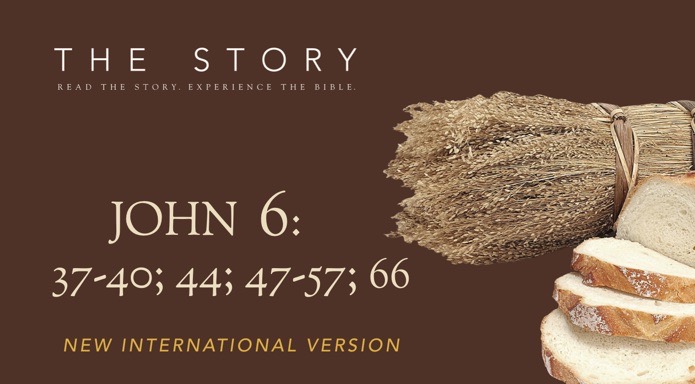
JOHN 6: 37-40; 44; 47-57; 66 NIV
Three words for today’s sermon: Belief, Cannibalism, and Nice.
1. “Belief” TROUBLES
We really need to take issue with the word “belief.” While it has stood dead center in America’s idea of faith since the Second Great Awakening, it remains a crippling dumb-down of what faith truly is in nature and spirit.
First, mere belief is too easy. Too much of what we call belief denotes nothing more than intellectual consent. Yes, I believe that men landed on the moon in 1969 despite the conspiracy theorists. I can believe this without any cost or consequence to my person. Believing by itself is far too cheap and easy to be a worthy synonym for biblical faith. That generations of evangelists have said, “All you have to do is believe!” participates in the erosion of good Christianity. It is the ultimate dumbing down of faith.
Secondly, beliefs are fickle. We can believe something for years and have it unmade with the morning news. One day you believe cholesterol is bad; the next day you learn that it is good. One day we believe that Wise Men visit the baby Jesus in his creche; the next we find our well-worn ideas stand in need of scriptural correction. Our beliefs change just that quickly.
Thirdly, the word “belief” is not what we have thought—or at least not what we have used it to mean. Even the English word “believe” derives from a stronger word and idea than mere mental assent. “Be-lief” comes from something like “be-love.” To belove the Lord is a much higher bar than just to believe.
Belief is simply not enough. In the book of James we read:
You believe that there is one God. Good! Even the demons believe that. —James 2:19
Again, mere belief is insufficient. Furthermore, we need to look behind the English word believe to its Greek roots. In Greek, the word pistis(and its variants) can mean believe or belief, but it chiefly means faith, specifically, to hold faith. In my translation, for our sake, I would use the word “trust” to capture Scripture’s intentions. It makes a huge difference.
Consider John 3:16 with the word trust in place of believe for the Greek pistis:
For God so loved the world that he gave his one and only Son, that whoever TRUSTS in him shall not perish but have eternal life.
Or “holds faith” in him would have the same effect; namely, to say that faith means more than holding ideas in your head, but entrusting your whole self into your faith.
Let’s look at another from Mark:
All things can be done for the one who trusts.” Immediately the father of the child cried out, “I trust; help my distrust!” —Mark 9:23
When you joined this congregation we did not ask you what you believe. The questions were:
- 1.Who is your Lord and Savior?
- 2.Do you TRUST him?
The focus of both is whom more that what. What you and I believe will change from time to time, seeking deeper dimensions based on our study and life experience, but what never changes is the one in whom we place our trust.
Trust is superior to belief, both in translation and in practice.
2. CANNIBALISM
This is a fascinating text full of troublesome detail—all things that would have been impossible for Jewish followers to have fabricated. In verses 51-52 of our text we read:
51 I am the living bread that came down from heaven. Whoever eats this bread will live forever. This bread is my flesh, which I will give for the life of the world.” 52 Then the Jews began to argue sharply among themselves, “How can this man give us his flesh to eat?”
Whatever constitutes being civilized, by which I mean whatever it is that constitutes the epitome of the civilized man or woman, no doubt at the opposite end of the scale is cannibalism. It is the worst, wildest, most inhumane thing imaginable. Yes, the Jews were offended by imagery—the merest suggestion—of cannibalism. This was unkosher to the extreme. The avoidance of blood and death constitute an enormous amount of Jewish purity laws. Jesus says the living bread from Heaven is his very flesh.
Now Jesus could have made it easier; he could have said, “Whoa, whoa! Listen, gentlemen, I’m speaking metaphorically! I don’t literally mean eating flesh; I’m speaking figuratively, okay?” Yes, he could have, but he didn’t. In fact, he goes in the opposite direction, holding their noses in it:
53 Jesus said to them, “Very truly I tell you, unless you eat the flesh of the Son of Man and drink his blood, you have no life in you. 54 Whoever eats my flesh and drinks my blood has eternal life, and I will raise them up at the last day. 55 For my flesh is real food and my blood is real drink.
Jesus doubles-down and the cannibalistic imagery is unavoidable. This is terribly disturbing and perhaps it is intentionally so. What does it say to us? Among other things, it says that Jesus’ incarnation is neither partial nor figurative. Jesus is not “just passin’ through,” but he intends to meet us and touch us intimately. This is extreme incarnation. It is not enough to merely come near to us; he must be taken physically inside of our bodies. When we eat the bread and drink the cup, his life and being become part of ours.
In the missiological classic, Peace Child, by Don Richardson, we hear the story of a Canadian Bible College graduate who, with his wife, enters into the pre-civilized world of Papua New Guinea in Indonesia.
His work has its ups and downs, but in time he learns that the people are cannibals. They deceive their enemies and once conquered, they eat part of their enemies bodies.
The idea is that they are taking their enemies’ life force into themselves. They become stronger and increase their longevity by doing so. It was also normal to eat from the bodies of their dead ancestors for the same reason—that they would take some of their grandparents’ life force into themselves so that their ancestors would continue to live in and through them.
Once these cannibals became Christian, they celebrated the Lord’s Supper with an intensity of joy and a deep understanding you and I will never quite appreciate. When they eat the bread, they truly believe they are taking the substance of Divine eternal life into their bodies. When they drink the cup, they sincerely feel that they are ingesting the life force of Almighty God.
In the films of these folks taking communion, you see them eat, sip, and then turn from the table with looks more joyous that you’ll ever see in a Western church. They get it.
Jesus could have made things easier or nicer, but he does not. He wants us to be deeply-connected to him. He wants us to know that our bodies belong to him every bit as much as our minds and good intentions. He is literally IN us as we celebrate.
3. NICE vs. Good
So we’re clear, there’s really nothing very nice about cannibalism. Let alone the ancient Jews, we 21st century suburbanites are equally revulsed at the idea. So we should be, for we need to remember and regularly remind ourselves that what is good is not necessarily what is nice. Nice is a sad substitute for good.
When Jesus clears the temple do you think he is smiling? Do you think he goes about proclaiming the Father’s honor like Mister Rogers?
[show nine pictures from history and popular culture of cleansing the Temple]:

The first is from a children’s book. He doesn’t look very nice.

This is Jesus the Angry Hippie. Next.
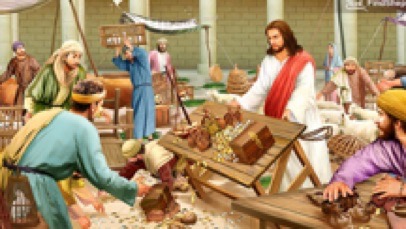
Here’s gentle Jesus turning over the table with his blood pressure at 1o0/45. This is the nice Jesus we love in the suburbs, but not the one of Scripture.

I reject this one outright on the grounds that Jesus looks like one of the BeeGees. Next.
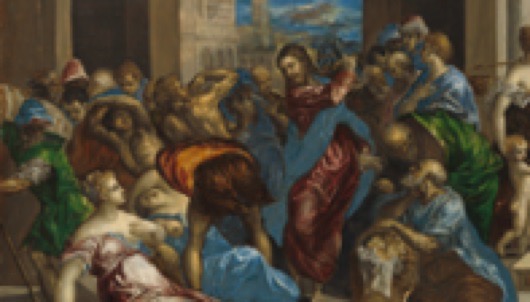
This is El Greco’s depiction. Jesus has almost no expression on his face whatsoever, which makes it impossible to imagine what he might be thinking or feeling. This befits much of the old, European worldview. This is the rational Jesus who acts from pure reason with neither passion nor emotion. Many Americans like to think of Jesus this way.
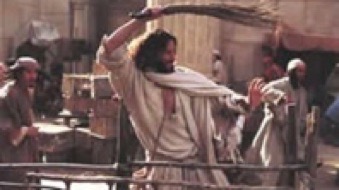
Jesus as Jackie Chan Ninja.

VERY angry Jesus. Not pleasant.

I feel sorry for this Jesus. He’s upset but no one seems to be paying much attention. No one seems to care much about the whip in his hand, etc. Perhaps this is what we have turned Jesus into by thinking of him as always being nice and pleasant—that is, a Jesus who has become ineffectual and no longer capable of speaking to the moral universe. This Jesus is the end result of making him totally and completely non-judgmental. ‘

This is my personal favorite, by Gustave Doré, a 19th-century French artist. In this one, Jesus looks both decisive yet grieved. He is not enraged with angry passion, but look like a father who must spank his beloved child—he looks grieved that it must be done.

In all things we too must aim toward what is good rather than what is merely nice. We can happy that they often coincide, but when they do not, let us not quibble over which side to take. It is not about us and what we like; it is about God and the glory we are created to serve. The center is Christ, not us.
Our world and culture is much disturbed over human sin and the natural course toward death. People march in the streets crying for justice and peace, and we can feel with them the longing for that same justice and peace.
Perhaps we should raise our focus a tad higher. Rather than focus on justice, let us focus on The Judge. Rather than our peace, let us pursue the Peace-maker. Let us think not to save the world, but let us serve the Kingdom and reign of God.
We’re all for justice, peace, and changing the world, but let it be about the goodness of God and the good he intends for us rather than the self-seeking endgames of personal passions and self-advancements. If there are temples yet to be cleared, let’s consider which version of Jesus we expect to do the cleansing.
Jesus’ Ministry Begins
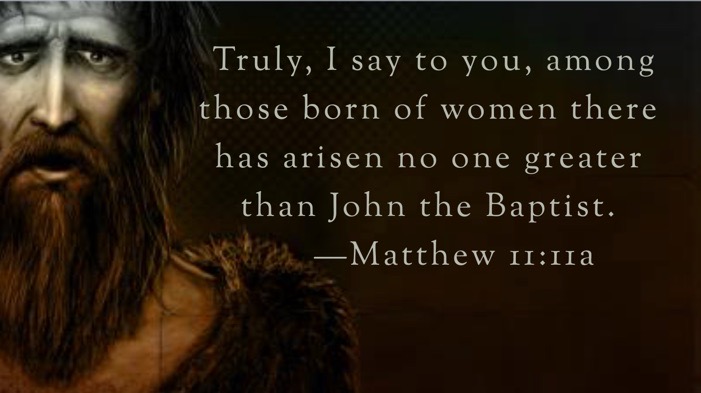
Matthew 3: 4-17 NIV
Warm-up Artistes
Generally, if you’re a headliner, you want an opening act that is beneath you on the talent/popularity scale. Did you know that Queen opened for Mott the Hoople? Stevie Ray Vaughan for Huey Lewis and the News? The worst: Hendrix opened for…(wait for it)…the Monkees!
When the opening act is so great, you’ve got to expect a phenomenal headliner. Following the shootings in Paris a few years ago, U2—perhaps the biggest band in the world at the time—served as the opening act for the Eagles of Death Metal, a band from Palm Desert. There was something beautiful and gracious about it. U2 took used all of its talent and gravitas in filling that stadium—all in order to pave the way for the Eagles of Death Metal, whose concert had been interrupted by terrorist gunfire. U2 turned over all its movement and momentum to a mostly unknown band and honored them beyond comparison.
When the best of the best says “Something’s coming, and we are not worthy to shine their shoes!” The people’s expectations go off the charts.
This is Israel. 430 years of waiting for a prophet—particularly the one who would introduce the long-awaited Messiah—built the tension like a winding coil. The spiritual hunger for God’s arrival and justice was feverish. The people awaited “Elijah,” who was not only the greatest prophet but the promised warm-up act for the Messiah.
The nation was poised for God’s self-revelation. Like a long-awaited Star Wars movie, the last preview has been shown, the lights dim, and the opening chord sounds—the audience is put on the edge of its seat, crazed with anticipation.
The people are ready.
John B. is Elijah
John created a movement—a revival—that drew people from all over Israel down to the Jordan river. His message is that of all the Old Testament prophets: God is holy and demands our righteousness but we—individually and collectively—fall short. He called Israel to confession and repentance. Baptism signified God’s mercy and forgiveness, the washing away of sins.
A few weeks ago, when we were still up at Camp Yerganawana, we remembered the account of Jesus’ transfiguration. A voice came out of the clouds and said, “This is my beloved Son; listen to him.”
At Jesus’ baptism, it is the same. Though he needs no baptism—since he was without sin—he steps into the water like the rest of us. He goes in to wash away the sins of Israel, perhaps even for those who have not yet repented, in order to “fulfill all righteousness.”
A voice comes from Heaven saying, “This is my beloved Son with whom I am well-pleased.”
As with the Transfiguration, Jesus is being authorized and legitimized by God the Father himself. This is terribly, terribly important.
First, it means that Jesus was not self-authorizing. Jesus didn’t just show up and say, “Hey everybody, I’m the Son of God in the flesh—you ought to believe in me because I say so.” Jesus could have said this because in truth he had that authority but he did not. Jesus’ self-revelation came through the way he lived—through his works, deeds, and character—not by proclaiming himself.
Second, it means that Jesus’ messiahship was not culturally constructed—it wasn’t an invention of the Jewish people. It couldn’t have been because though ravenous for a Messiah (and they had advanced more than a dozen candidates in previous years), they could not have conceived of one who would be both figuratively and literally God’s Son. That was nowhere in the Jewish imagination; in fact, that was categorically excluded.
In his baptism, Jesus has the authorization of Israel’s greatest prophet and the voice of God the Father to proclaim him as more than Messiah; he is God’s Son which means he is God in the flesh.
Lest anyone think that John might have been an unbalanced cult leader like Jim Jones or David Koresh, Jesus makes clear that John was the greatest human being ever born:
Truly, I say to you, among those born of women there has arisen no one greater than John the Baptist. —Matthew 11:11a
Furthermore, Jesus later reveals that John is the Spirit of Elijah:
For all the Prophets and the Law prophesied until John, and if you are willing to accept it, he is Elijah who is to come. —Matthew 11:13-14
This is followed by a marvelous promise to you and me—the promise of what we are made into by the grace of Christ:
Yet the one who is least in the kingdom of heaven is greater than he. —Matthew 11:11b
John glorifies Jesus. John’s movement in time is handed over to Jesus, and now John’s powerful popular movement all un veeringly focuses and points to one thing: that Jesus is Messiah.
Not John only, but the proclamation has become that the Law, the Torah, and the Writings—the entirety of the Old Testament—constitute a grand pyramid leading to one, central point: a capstone of utter fulfillment and God’s self-revelation. John names it when he sees Jesus and proclaims him the Lamb of God who takes away the sins of the world.
The warm-up act has done its job and Jesus is announced and steps onto the stage. The only problem: Israel was such a social/political/theological mess that it had lost all eyes to see and ears to hear.
ISRAEL: MESSED UP
Providing a picture of the context into which Jesus is introduced is necessary, for we will be reading through this all Fall. It is important that we know and understand who are the main players in the gospel drama of Israel. As we consider them, I invite you to find some of yourself reflected in each.
The Players
Sadducees
These were the Jews who followed the Torah alone. No prophets, no Wisdom literature—just the basics, just Moses. They were aristocratic, wealthy, and constituted much of the ruling class. The Sanhedrin was Sadducee-heavy. They were sophisticated—probably well-educated in Greek as well as Hebrew—and they in large part ruled the Temple. Theologically, they were fiercely materialistic. They denied the supernatural almost entirely, disbelieving in angels, demons, or an afterlife. They denied all talk of resurrection.
Today, the Sadducees are probably best represented by seminary-educated clergy, especially those who went to Princeton Theological Seminary and like to quote high-brow theologians like Karl Barth. They stand around at Alumni meetings and chuckle amusedly over the escapades of trailer park evangelists. [Okay, I need to take a breath now].
Pharisees
Pharisees were the true believers and true practitioners of Judaism. They were “on fire for the Lord” laypeople, following the Torah, Prophets, & Writings to the letter (all KJV, no doubt). They were the most-committed, most-observant devotees of Judaism and referred to themselves as “the Righteous Ones.” Purity, devotion, and sincerity above all shaped their discipline.
These are like the “on fire” Christians who are better believers than you and me. They are super-Christians, super on fire for the Lord and tend to call attention to the fact that most other Christians just don’t measure up.
These first two groups—Sadducees and Pharisees—are the ones who riled Jesus the most, the ones who merited his anger and harshest words. We clergy and devout believers need to keep that in mind as we read through the New Testament.
Essenes
These were those who had departed the rest of the world in order to seek ultra-purity. The Essenes resided down toward the Dead Sea at Qumran, and embraced a life of ultra-purism and separation from the evils of the world.
We think John the Baptist may have started here, as one who shunned the things of the world in order to focus on pleasing God.
Essenes were monastic, celibate, and spent their days as scribes and practitioners of righteousness. They had several baptisms, sometimes several in the same day. To them, cleanliness meant godliness.
No just anyone could be an Essene. They were strictly exclusive and elitist. They believed that a Messiah, a Son of Man/Son of God, would come and initiate the battle for Israel. God and the angels would come down and fight against the Sons of Darkness, and the Sons of Light would be eternally vindicated.
Do we know people like this? They are overwhelmed by the modern world to the extent they just want to stay at home in their basements surfing the internet for end-of-the-world scenarios? They long for that special, insider information that sets them apart from the hoi polloi and distinguishes them as part of the elite group of “knowing ones”?
The People
The people are those Jews living throughout Palestine who are just trying to survive. They too are looking for hope and deliverance. They are loyal to God, country, and Temple, but frustrated by the Roman occupation and the self-serving interests of the Temple leaders.
Among them, there were Zealots—political revolutionaries and radicals who sought the Messiah as a military rallyer who would lead the people to take back Israel by violent revolution, if necessary. The Zealots were activists who sought justice and the vindication of the Jewish people.
Today, we would call these “folks” with the additional “radicals” for the Zealots.
Sinners
Sinners may not be who you think. When the gospels mention “sinners,” our contemporary imaginations run to scenes of gangsters in Las Vegas surrounded by gambling, booze, drugs, wild sex, and other corruptions. For the New Testament context, the word “sinners” usually refers to Jews who had no connection to the temple—Jews who had lost their status in the larger Jewish community.
Non-tithers could be cut off from the Temple. They were disconnect, non-observant or semi-observant Jews just making their way in the world.
Sinners were those who had been disowned by the temple leadership for whatever reason. They were still “Jewish” in every sense of the word, but they were not considered Jews by the top brass.
When Jesus says, “I’ve come for the lost sheep of Israel,” he means these. When he is accused of eating with “sinners and tax collectors,” it means he was meeting with his people who had been pushed beyond the margins of Jewish acceptance.
Today, these could be lapsed Christians, non-observant Christians, or even beyond—that group of wild folks converging on Vegas. Sinners are never hard to find.
Gentiles
Gentiles means all non-Jews. In the gospel environment, it meant the Romans who ruled, occupied, and taxed Israel. It meant Arabs sharing the land and doing commerce in their cities. Greeks, Egyptians, Syrians, and others made livings in Palestine and were generally looked down upon by the Jews. They are regularly referred to as “aliens,” and a premier virtue among Jews included showing hospitality and fair treatment to all aliens in their land.
To Christians today, our “gentiles” are people of other faiths and non-western cultures. We too should be diligent in practicing responsible hospitality.
Seeing Ourselves
As we see ourselves in these different people groups, we too are called to repentance and confession, but unlike the baptism of John, we have a different foundation.
Jesus the Messiah fulfilled all righteousness for us. When we offer him our sins, he takes the full weight upon himself. In that hole left from our discarded sins, he places his Holy Spirit.
When we remember our baptism, we recall that Jesus was baptized for us as well, making our baptism all the more powerful.
The life we live is a response of gratitude. We are no longer obliged to fulfill righteousness because that has already been finished by Christ.
We “practice” righteousness because it is no longer demanded of us. As a lawyer practices law and a doctor practices medicine, we disciples of Jesus practice righteousness. We are practitioners of righteousness, neither assuming we master the tasks nor complete them in the flesh.
May God receive all praise and glory for all he has done on our behalf! †
The King is Born
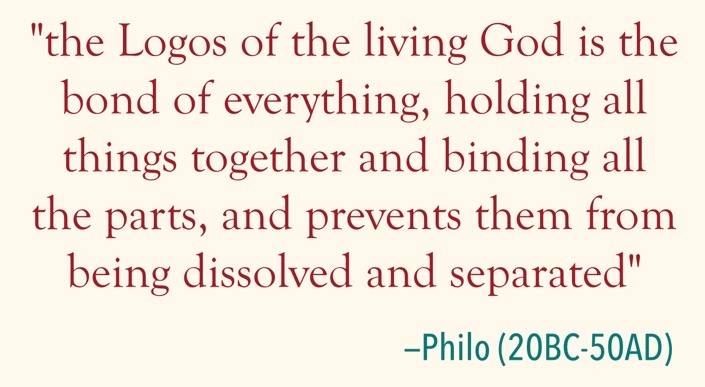
JOHN 1: 1-8
IN THE in-between
From the end of the prophets there was 400 years of waiting for the spirit of Elijah to return. The spirit of Elijah, passed to Elisha and the other prophets, fell silent with the final words of the Old Testament, from Malachi 4:5:
Lo, I will send you the prophet Elijah before the great and terrible day of the Lord comes.
For 400 years, the people awaited a prophet to come and announce the Messiah and the day of the Lord which would judge the world and recreate David’s kingdom in permanence.
Within one-hundred years, Alexander the Great spread his reign across the ancient world and as far east as Persia. The Greek language becomes the imperial standard, and the Jewish scriptures are copied into the Greek version called the Septuagint.
The synagogue is born—gatherings of God’s people beyond the bounds of the temple walls. These were houses of worship and study where Jews could learn Torah and hear commentary from local rabbis.
Between 174-164 BC Antiochus Epiphanes, a Greek/Persian leader, attacks Egypt and oppresses the Jews along the way. He murders tens of thousands—a Hitler of his day. His plan to destroy Jerusalem and the temple is thwarted by the Maccabees (we all should read the Apocrypha, which was produced and collected during this in-between period). Antiochus looked to win but the Jews held out. It takes seven days for olive oil to be burnable in the lamps of the temple. The miracle of Hannukah is that the lamps burned for seven days such that the temple flame never went out.
In 66 BC Roman General Pompey intervened in a civil war among various factions vying for power and maintained control until Judea formally became a province of Rome in 6 AD.
The people were hungry and thirsty for the Messiah. They needed God to come down and reveal himself just as the prophet Isaiah had said over 400 years prior:
O that you would tear open the heavens and come down,…to make your name known! —Isaiah 64:1-2
After all that time and waiting the spirit of Elijah returns in the person of John the Baptizer—the first prophet seen in 400 years—who is not recognized as a prophet by the Temple authorities. He has all the signs and the people follow him in droves, believing him to be an authentic prophet of the Lord, but the Sadducees and Pharisees reject him outright because he wasn’t one of them.
TWO JOHNS
Just as we have John the Baptizer who leads us up to Jesus, we have John the evangelist who follows and leads us on from Jesus. One John is a pre-ministry witness to Jesus, the other a post-ministry witness. Although John’s gospel is likely the last one to be written, it corrects some of the ill thinking that grew out of the early church. John reaffirms with ringing clarity the authentic faith of the original Apostles to quash new-blooming heresies and set the Church aright.
It is said that the early church fathers read the synoptic gospels—Matthew, Mark, and Luke—through John! Many moderns wrongly devalue John due to its later authorship, but they do so at their own peril. Understanding John is critical to understanding the early faith of the Apostles, the earliest Church, and the other, competing, gospel communities.
IN THE BEGINNING
It is right that we should begin The Story’s New Testament narrative with John’s prologue, for it is the new Genesis. Let’s hear that beginning again, verses 1-3:
In the beginning was the Word, and the Word was with God, and the Word was God. 2 He was with God in the beginning. 3 Through him all things were made; without him nothing was made that has been made.
This is the creation story updated for the new age in Christ. A new era has begun in Jesus because the curse of death has been annulled and the code for immortality cracked. Jesus lives, not merely in the popular imagination but in the flesh. He is raised.
Notice in those first lines we get the when, the where, and the who for the cosmos. Not so much how. We are given the reason for creation. That reason is the Word.
Now the word for word is logos, which you’ve probably heard before. For the ancient Greeks, the Logos was more than just a word for word; it was a foundational philosophical reality. Its meanings were several:
- 1.Speech or discourse.
- 2.Reason, logic, and/or that which persuades.
- 3.The animating principle behind the entire cosmos.
- 4.The Demiurge: an intermediary divine being in-between God and the material world.
The Greeks believed that God was pure and perfect and the material cosmos was evil. To them, what was “spiritual” was always the good and whatever was material or in the flesh was wicked. The Logos was understood as the means by which the good God could shape the evil world. But it wasn’t an inanimate force; it was part of God.
When John writes In the beginning was the Logos, and the Logos was with God and the Logos was God, ancient Greeks would have yawned. “Yeah, we know all this—tell us something we don’t know.” When they get to “and the Logos became flesh and dwelt among us,” they would have gasped. For the Logos to become flesh would be for the unthinkable and impossible to occur.
Philo, a Greek-educated Jew (20BC-50AD), writes in a way to make George Lucas envious:
“The Logos of the living God is the bond of everything, holding all things together and binding all the parts, and prevents them from being dissolved and separated.”
Ironically, Philo called the Logos “the first-born of God.”
LOGOS: GOD’S SON
In common speech, when we speak of the “Word of God,” what are we talking about? Yes, we refer to the Bible as the Word of God. We really should be careful about this. Nowhere in the Bible does it claim to be the Word of God or the words of God, although many of the Lord’s words are recorded there.
The Bible clearly does call Jesus the Word of God. Jesus is the Word, the Logos made flesh.
The Word of God is Jesus Christ. We shouldn’t confuse the Bible with the person of Jesus.
When I was first ordained and working in Dallas, I used to go down to Dallas Seminary to browse their bookstore and pick fights(theological) with Dallas seminarians. Out in front of the seminary there is a sign: “Preach the Word.” Standing among several seminarians I asked them, “When are they going to finish it?” “What do you mean?” they asked. I asked them, “What does it mean to preach the Word.” One of them held up his big Scofield Reference Bible. “Preach the Word—the Bible!”
“No,” I said, “the sign ought to say, ‘Preach the Word and Him crucified.’”
We must take care that our figurative language not be taken literally. We mustn’t confuse the container with the thing contained.
If I’m holding a fresh pot of coffee and I ask you if you’d like a cup, then I’d be a cad to hand you an empty coffee mug. You don’t really want the cup, you want that tasty, dark, br0wn liquid that goes inside.
Likewise, if you have a ground-floor room with no windows and you add a big, beautiful, plate-glass window which opens onto your gorgeous flower garden, you might say, “What a lovely window!” but only an oddball would pay all their attention to the glazing and framing of the window itself.
The Bible is not the Word of God in and of itself, it is the container, the window, through which the Word is revealed to us. It is a pointing finger, pointing with eternal persistence toward Jesus, who is the Word of God made flesh.
In worship, before every reading of Scripture, we say “Listen and hear the Word of the Lord,” We don’t say, “Hear the words of the Lord,” nor are we saying “Hear the Bible.” We are saying, “Listen, and hear the revelation of Jesus Christ.” At the end of every reading, we say, “the Word of the Lord” which is not a celebration of the Bible itself, but a celebration of Jesus who is revealed through Scripture. We do not reverence words on paper; that is what we call Bibliolatry. So let us take care. Jesus is the Word of God—the Word made flesh—and the Bible is the Word written. Whenever we refer to the Bible as the Word of God, we are referring to what it reveals, not what it is in and of itself.
Poetically it’s fine, but it to say, “Hey, hand me The Word” when pointing to my Bible is the same as saying, “Hey, hand me Jesus,” which is not all bad.
JOHN’S CORRECTION
Again: the other gospels need to be seen through John because John corrects misconceptions that had grown up in various outcroppings of infant Christianity. John makes crystal clear what was the faith of the original Apostles; namely, that Jesus is fully divine as well as fully human.
The earliest heresies tended toward one of two errors. Like the two sides of a tightrope walker’s balance pole. On one side the fall was to say that Jesus was not really divine, but merely human. The other side falls by saying that Jesus was divine, but only appeared to be human.
The first of these two heresies is called Adoptionism. Adoptionism holds that Jesus was a normal man who was chosen—perhaps at the moment of his baptism—to be the Messiah and figurative “Sonf of God.” This view was held by many Jewish converts who sought to protect God’s sole divinity, but it was never Christianity.
The other heresy was Docetism. This was popular among the Greeks who felt that flesh and matter were evil, therefore, Jesus could not have actually been in the flesh, but merely appeared to be in the flesh. He was not really human, but just appeared to be, like a hologram. This was more prevalent in John’s community. It was so important that it is directly addressed in John’s first epistle as the very means by which we judge what is true from what is false:
Dear friends, do not believe every spirit, but test the spirits to see whether they are from God, because many false prophets have gone out into the world. 2 This is how you can recognize the Spirit of God: Every spirit that acknowledges that Jesus Christ has come in the flesh is from God, 3 but every spirit that does not acknowledge Jesus is not from God. This is the spirit of the antichrist, which you have heard is coming and even now is already in the world. —1 John 4:1-3
John rules out both Adoptionism and Docetism, proclaiming the faith that was from the beginning: that Jesus is certainly divine—The Word made flesh—and also fully human.
Virgin Birth: YES!
The Christian faith has also affirmed from day one that Mary was a virgin—not merely a “young woman”—when Christ was conceived in her womb. This is a necessary doctrine, because Jesus had no earthly, human father. If he did, then we all fall into Adoptionism perforce.
I’ll save more for Advent, and I know that you—like me—are thankful that we won’t be singing any Christmas Carols today in September! †
JAZZ SUNDAY: NEW CREATURES

“NEW CREATURES”
2 CoRINTHIANS 5: 16-20
16 From now on, therefore, we regard no one from a human point of view; even though we once knew Christ from a human point of view, we know him no longer in that way. 17 So if anyone is in Christ, there is a new creation: everything old has passed away; see, everything has become new! 18 All this is from God, who reconciled us to himself through Christ, and has given us the ministry of reconciliation; 19 that is, in Christ God was reconciling the world to himself, not counting their trespasses against them, and entrusting the message of reconciliation to us. 20 So we are ambassadors for Christ, since God is making his appeal through us; we entreat you on behalf of Christ, be reconciled to God.†
Jazz cats
Yeah, we’d all like to be jazz cats—so much of what we call cool originates with jazz culture, including the word cool. Who wouldn’t like to be able to play an instrument with such complete abandon and freedom as a jazz artist? They seem to be one with their instrument, which becomes for them a means of language and a vent for the otherwise inexpressible longings of the human heart.
We’ve heard stories about people with head injuries or people born on the autism spectrum who can sit down at an instrument and play in no time as if they had been rehearsing for years. Wouldn’t it be wonderful to know that kind of giftedness?
Jazz is american
Jazz is the great American music. It is music of the American experiment—the cultural melting pot—and it couldn’t have emerged from anyplace else.
Jazz emerged from pain and hardship, combining African-American blues and ragtime with European military band music. In the early 20th century, Jazz grew through greatness—the Great War and the Great Depression.
By World War II, Jazz was the American mainstream, expressed in the high elegance of the Big Band era.
Nazis hated jazz
Just in case we needed another reason to despise Nazis, we know that they hated jazz. They hated jazz because jazz was America and all America stood for: multi-racial, polyphonic, syncopated, bass-slapping, jitterbugging, sexy fun.
Nazis prohibited jazz and went to great lengths to pick out anything too jazzy. From their propaganda, we read:
1. Pieces in foxtrot rhythm (so-called swing) are not to exceed 20% of the repertoire of light orchestras and dance bands.
2. In this so-called jazz type repertoire, preference is to be given to compositions in a major key and to lyrics expressing joy in life rather than Jewishly gloomy lyrics;
3. As to tempo, preference is also to be given to brisk compositions over slow ones (so-called blues); however, the pace must not exceed a certain degree of allegro, commensurate with the Aryan sense of discipline and moderation. On no account will Negroid excesses in tempo (so-called hot jazz) or in solo performances (so-called breaks) be tolerated;
4. So-called jazz compositions may contain at most 10% syncopation; the remainder must consist of a natural legato movement devoid of the hysterical rhythmic reverses characteristic of the barbarian races and conductive to dark instincts alien to the German people (so-called riffs);
5. Strictly prohibited is the use of instruments alien to the German spirit (so-called cowbells, flexatone, brushes, etc.) as well as all mutes which turn the noble sound of wind and brass instruments into a Jewish-Freemasonic yowl (so-called wa-wa, hat, etc.);
6. Also prohibited are so-called drum breaks longer than half a bar in four-quarter beat (except in stylized military marches);
7. The double bass must be played solely with the bow in so-called jazz compositions;
8. Plucking of the strings is prohibited, since it is damaging to the instrument and detrimental to Aryan musicality; if a so-called pizzicato effect is absolutely desirable for the character of the composition, strict care must be taken lest the string be allowed to patter on the sordine, which is henceforth forbidden;
9. Musicians are likewise forbidden to make vocal improvisations (so-called scat);
10. All light orchestras and dance bands are advised to restrict the use of saxophones of all keys and to substitute for them the violin-cello, the viola or possibly a suitable folk instrument.
If the politics of hatred hated Jazz so vehemently, what does that make Jazz but the music of love? Love of all peoples, new forms, and the free spirit of free speech and expression?
Jazz is Freedom
A jazz approach to music (and life) is going to say there is always more to the music than just what is on the printed page. The script may be fine, but there may be something off the script and beyond the script that we are yet to discover.
A classical musician may be an unsurpassed virtuoso, but they may spend decades playing their music with only the strictest adherence to the script. No departures whatsoever. The thing is with jazz that it comes into its own realm through improvisation. The artist becomes writer in a spontaneous utterance through solos. It really has to come from the artist’s own soul. It is intensely personal and thereby deeply spiritual.
New Creatures
In our text, Paul proclaims that we who are in Christ have become “new creatures.” What exactly is it that makes us new?
1. We are made new by being released from the burden of righteousness. We are free from trying to establish righteousness by our own good will. Instead, we receive the righteousness of Christ as a free gift.
2. We made new by God’s undeserved favor in Christ; specifically, the total forgiveness of our sin. We become free because we are no longer imprisoned under the curse of sin.
3. We are made new by the extraordinary promises of eternal life. Death no longer will hold us and we shall be raised to immortality.
We acknowledge that Christ alone has-accomplished this renewal, and we are simply blessed to live in it.
What is the difference does it make? All the difference in the world! We have been translated from Death to Life, fFrom despair to hope, and from self-absorption to Love.
We are new creatures, partaking in the new humanity initiated by Christ.
Jazz Discipleship
Our discipleship is a lot like jazz. We are made new in the awareness of our unique giftedness. God has given us all gifts in order that we learn to ply them to his glory. In short, God expects us to take up our instrument and to blow, Daddio!
Jazz musicians spend years in the scales and experimenting their way through the jazz classics. In time, they come to discover and develop their own voice. Voice—that place of utter originality—is what every follower of Jesus seeks in living their lives. To love as deeply and truly as one can is the aim, the music. Discipleship is a matter of each of us exploring virtue and finding our heart’s truest expression of grace.
Like jazz, our best soul work emerges out of pain and hardship. Without suffering, there is little depth. In spite of that pain, our God-given gifts need to be exercised. They are like old saxophones found in the attic: the brass may be faded and tarnished and the pads may require new leather, but it is time to take it down and to learn how to play. Our gifts are given us to be used.
Yours is your heart—the instrument of love, sacrifice, service, and soul—and the song that is you and nobody else needs to be heard through the world as your unique and extraordinary witness.
The axe is in your hand; will you play?
Lions not lambs
Did you ever hear the story about the lion who thought he was a lamb? There once was a lion who thought he was a lamb. When he was just a baby, his mother was taken by a hunter and he was left all alone. Seeing the poor lion cub and having pity on him, a group of sheep took him in and raised him as one of their own. As he didn’t know any better, the lion cub believed that he was a sheep. He stuck with the herd, wandered about with them, and ate grass. When a predator came near—such as a coyote or lion—he cowered and ran off for safety with the herd. Inn time, as he grew, he felt something stirring in him. He tried to push this feeling away and continue to live as a lamb, but it was not his true nature and the feeling of unease grew within him as time went on.
Then one day a huge lion appeared, roaring on a hilltop with all his might. All the sheep ran, but the young lion didn’t move, he was petrified, but at the same time he was curious. He felt a strange sense of “knowing” and wanted to understand what this feeling was. The old lion approached him and asked him what he was doing with the sheep, to which he replied “I am a sheep”. The lion laughed and roared: “you are not a sheep, you are a lion!”He took hold of him and held up his claws. “Do those look like sheep hooves?” He smacked him on the back end and said, “Does that look like wool to you? And what’s this?” he added, grabbing hold of the lion’s tail. He then lifted and carried the young lion to a nearby pond, up to the water’s edge until the waves on the pond were absolutely still and all was silent. As he looked into the mirror-like reflection of the crystal clear water, the young lion saw the old lion’s face, then his own – after looking again and again he suddenly saw it for the first time and he roared, “Yes! I am a lion!”
Sax in your Hand
Brothers and sisters, we are new creatures in Christ. We are made to be lions, not lambs. We are not to be skittering with the herd but roaring with the pride!
Somewhere along the line, Christians got the wrong idea about humility, as if being servants in God’s name meant that we are to play doormat to the rest of the world and rollover at every confrontation. Au contraire! In that we are new creatures, we are the sons and daughters of the King of Heaven—we are princes and princesses, nothing less.
The world around us is filled with lots of noise, lots of it dark indeed. Closing our eyes, ears, and mouths to evil may protect our innocence and defend our spiritual temples from pollution, but we are here for a purpose greater than self-defense; we are here to take part in the eternal glorification of God, which is our eternal joy as well.
We—the Body of Christ—are very much like a jazz band. We are as different one from another as a saxophone from a piano, a drum kit from a stand-up bass, but the song that comes through us by the Spirit unites and combines us to produce an amazing song.
We need that unity in a divided America today. We need that song to be heard by broken and despairing hearts. America’s eyes and ears are searching for something true and good to believe in and follow.
May we—you and I—become carriers, couriers, and transmitters of that song. We learn the tune by having open eyes and ears; we play that song whenever we open our mouths in thanksgiving or praise to God.
God has put a sax in your hand.
Come on! Blow, Daddy! Be! Become!
Let fly faith, hope, love like crazy!
You and me—we need to be heard.
Let’s start working on our roar. †